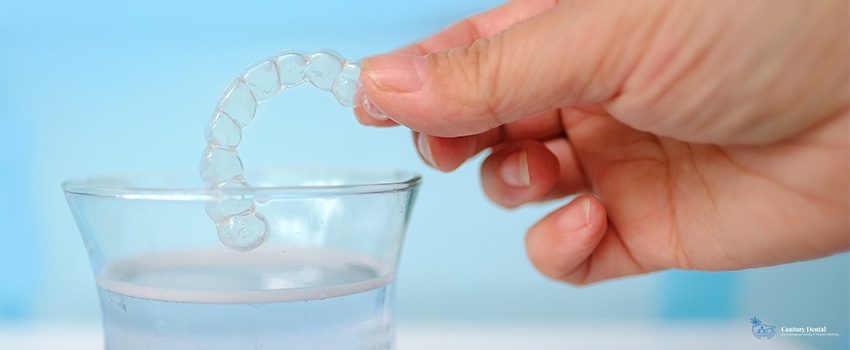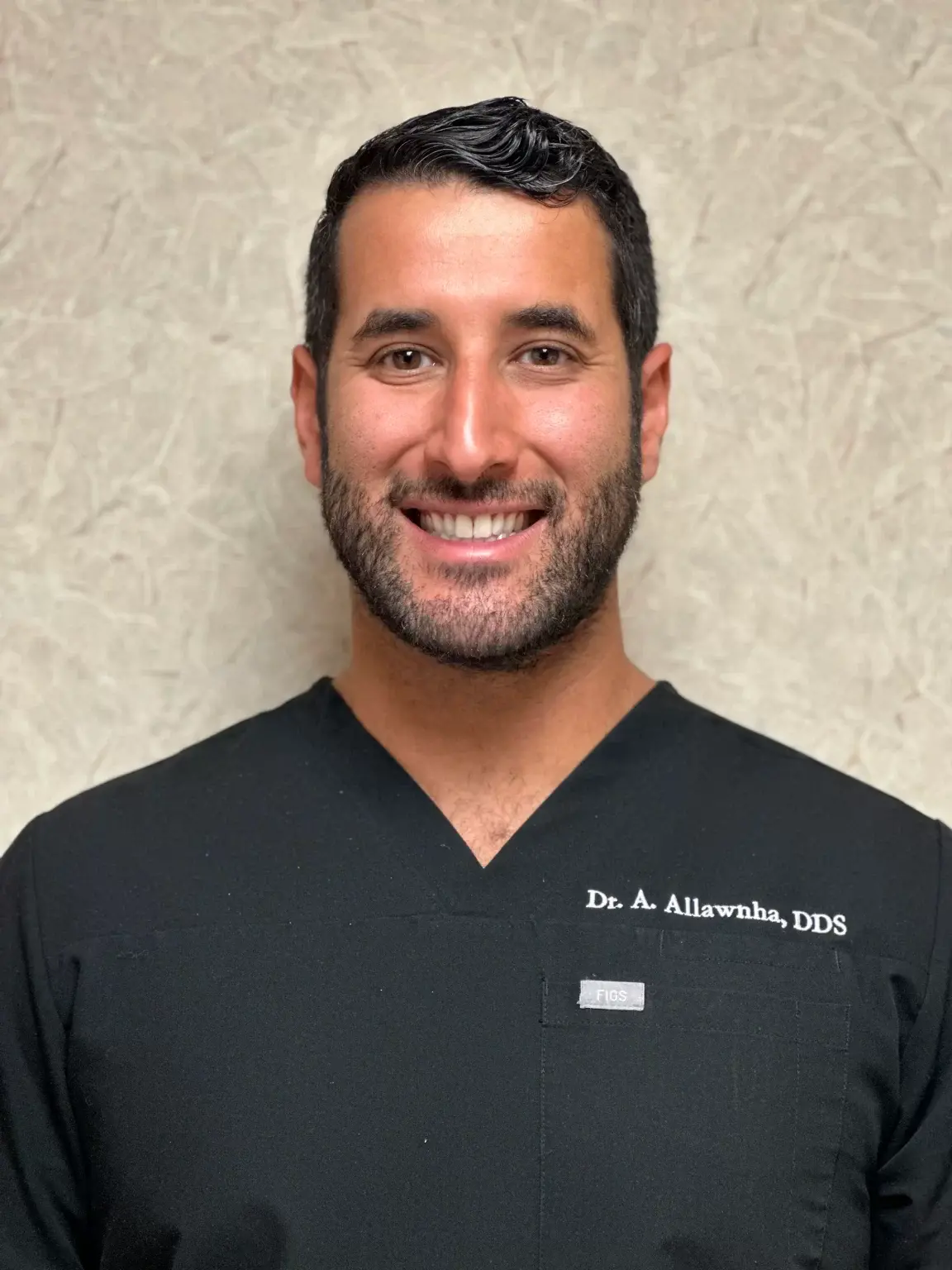A night guard is a removable device that covers your teeth. This device can be worn while you sleep to protect your top and bottom teeth. It is also used to reduce night clenching and teeth grinding, also known as sleep bruxism.
You can also use night guards, also known as mouth guards, to treat temporomandibular joints (TMJ) disorders.
Some people wear mouth guards when playing sports such as football, hockey, or boxing. The mouth guard protects their teeth and reduces the chance of getting hurt.
It is important to clean your night guards regularly because bacteria can build up on them. Bacteria can multiply without regular cleaning and cause infection or bad breath.
Below are different types of night guard and how to clean a night guard properly to make it last.
What Is a Night Guard?
Night guards, also known as dental guards, occlusal shields, and bite splints, are plastic retainers that look like guards. They can be either hard or soft. They can be worn on the top or bottom set of teeth. Because patients have different tooth patterns, a night guard can be customized to fit each patient. It is made from a mold that fits your teeth and doesn’t become uncomfortable or bulky.
Types of Nightguard
The American Sleep Association follows a classification system for dental guards that is based on the material they are made of:
1. Hard Night Guard
A hard night guard is composed of acrylic trays used to treat TMJ problems and severe teeth grinding or clenching cases. Your jaw and muscles will relax if you adjust the bite on your guard. As muscles relax, the bite changes because the lower jaw is in a healthy centered position.
2. Over-The-Counter
Over-the-counter day guards can be purchased at drug stores. They come in one size that fits all. There is also the option to use the boil-and-bite type. They should be softened with hot water for a better fit. Because they are not made for your specific teeth shape, you may notice a shift in your bite if you continue to use such devices.
3. Custom-Made
Custom-made mouth guards fit individual needs. They are created using your dental impression. A custom-made dental guard is created using the best materials and techniques. They can last many years if appropriately maintained and adjusted as needed.
How Important Is a Night Guard?
They are oral devices that protect your teeth against the harm caused by grinding. A night guard can be used to prevent patients from grinding their teeth. Here are some of the things a mouth guard prevents.
1. Plaque Development
Despite the similarities in their names, you shouldn’t confuse a sports-related mouth guard with one for teeth grinding and clenching prevention. It covers the teeth and gums to protect them against blunt force trauma. You can catch bacteria on your gums’ surface by wearing it at night.
Saliva neutralizes acids which can lead to cavities. It also washes away food particles and prevents plaque formation. It is important to consult an orthodontist before you purchase a dental guard. According to the state of your teeth, a dentist will recommend the correct design. Many mouth guards for night use are designed to allow saliva to get to your teeth.
2. Bite Change
Because a mouth guard protects the surfaces of your teeth from grinding against one another, it is often designed for your teeth and bite. It is essential that you get a mouth guard that fits your mouth perfectly.
Sports mouth guards can be softened and made of thicker rubbery materials. They don’t usually fit your bite. The brain will interpret softer material as food, and you might chew it while you sleep. It could cause muscle discomfort or the premature wear of the soft material. You may also notice a shift in your bite if you use a sports mouth guard at night.
3. Teeth Damage
Teeth grinding is a process that occurs when you grind, gnash or clench your teeth.. As a result, your enamel weakens. Teeth sensitivity is caused by enamel erosion, lowering your mouth’s tolerance for hot or cold foods and beverages. Your teeth are also more susceptible to decay if there is no enamel to protect them. If the decay progresses into the enamel, it is possible to get infections.
Teeth grinding causes tooth damage by breaking a weak tooth or wearing out fillings. While the teeth’s surface can handle the pressure of chewing and biting, it cannot withstand the added pressure of grinding and clenching. As a result, tooth cracks and fractures can occur. Tooth fractures cause severe pain. You may need to visit the dentists. Although a dentist might be able to do a filling, you’ll probably need extensive treatment such as root canals and crowns. Implants or bridges can be used to fix tooth decay.
4. Temporomandibular and Joint Disorders
The temporomandibular joints (TMJ) connect the jaw and skull. They affect the muscles that you use to chew. You can cause misalignment by clenching your teeth while you sleep. When misaligned, you develop TMJ dysfunction. This disorder can lead to chewing difficulty, pain around your ears, and even headaches. Disk displacement can also occur if you inflict damage to the articular disc. You may experience your jaw locking or closing unexpectedly. It could lead to a visit to the ER.
A dental guard relieves tension on your jaw muscles and prevents TMJ.
5. Chronic Headaches
TMJ dysfunction can manifest as migraines, so chronic neck pains and headaches are often the first signs of possible bruxism. Tight muscles cause headaches in the neck and jaw.
You don’t have to rush to diagnose yourself to see if you have bruxism. There are ways you can verify that your headaches are caused by teeth grinding. Look at the surface of your teeth. If your teeth aren’t pointed but have become flattened, this is a sign that you do teeth grinding in your sleep. You can also check for a receding gum or bone. This could happen due to clenching. A night guard custom-made to your specifications can eliminate headaches.
How to Clean Your Nightguard
Mouth guards are porous and harbor many bacteria, yeasts, and molds. Mouth guards can become a reservoir of bacteria that can lead to gum infections and bacteria that promote tooth decay. It is vital to know how to clean a night guard properly.
1. Denture Cleaner
How to clean mouth guard with a denture cleaner
You can use an OTC non-abrasive, over-the-counter denture cleaner if your mouth guard needs to be cleaned more thoroughly.
OTC denture cleaners typically contain sodium hypochlorite, which is a chemical bleach. It’s safe for your mouth guard and if it’s used per directions.
OTC cleaners can contain synthetic fragrances or artificial colors. Chemical cleaners might not be the best option if you are sensitive to fragrances and/or concerned about these ingredients.
Do not soak your mouth guard too long in the cleaner. It could cause damage to your mouth guard.
Allow your mouth guard to soak for five to ten minutes. After that, brush it gently with cool water. Allow it to dry.
2. Mouthwash and Water
A mouthwash’s antimicrobial properties can be used to clean your mouth guard. Use alcohol-free mouthwash to avoid any damage.
Prepare one cupful of alcohol-free mouthwash and enough water to submerge your dental guard fully. Allow it to sit for 30 minutes. Remove and rinse with cold water. Then let your mouth guard dry.
3. Vinegar and Hydrogen Peroxide
How to clean your night guard with vinegar and hydrogen peroxide
For 30 minutes, soak your mouth guard in a cup of white vinegar. Rinse thoroughly with warm water and then immerse it in hydrogen peroxide. Hydrogen peroxide acts as an oral disinfectant. It can remove more buildup than either denture cleaners or mouthwashes.
4. Mild Soap
Use an alcohol-free soap, such as castile soap or dish soap. Brush your mouth guard gently with a toothbrush. Rinse and dry. Avoid using hot water to rinse, as it may cause deformation.
5. Non-Abrasive Toothpaste
Instead of using sodium fluoride, brush with a non-abrasive or low-abrasive toothpaste, an ideal night guard cleaner. Avoid using hard brushes as they can cause damage to the mouth guard.
It is best to keep a separate toothbrush for this purpose to prevent cross-contamination.
6. Baking Soda
Using baking soda and warm water makes a great night guard cleaner because it can clean the surfaces of your dental guard.
Combine equal amounts of baking soda and water in a bowl to make a paste. Dip a toothbrush in the paste. Gently brush the paste onto your mouth guard. Cool water can be used to rinse the mouth guard. Let the mouth guard air dry.
7. Case Cleaning
Placing your dental guard in a dirty case defeats the purpose of cleaning your dental guard regularly.
You can keep the case clean by washing it with regular dishwashing soap, or castile soap every few days. Don’t use a dishwasher to clean your dental guard or dental guard case. The high heat can cause the plastic to melt or warp. To prevent bacteria growth, let the case dry after washing.
How Frequently Should a Mouth Guard Be Cleaned?
You should clean your mouth guard after every use. The following cleaners can be used for daily cleaning:
- Toothpaste
- Soap and Water
- Mouthwash
- Baking Soda
Deep cleaning is best done with stronger cleaners. OTC denture cleaners, as well as vinegar with hydrogen peroxide, are acceptable.
Century Dental Keeps Your Mouth Guard Clean
Don’t listen to anyone who says that all you need to clean your mouth guard with is warm water.
If after you have tried all of the methods, and your mouth guard still looks worse, bring it to Century Dental, your dentist in Treasure Island, FL, and get it professionally cleaned or replaced.





